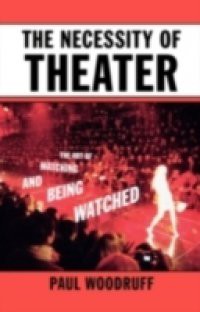What is unique and essential about theater? What separates it from other arts? Do we need "theater" in some fundamental way? The art of theater, as Paul Woodruff says in this elegant and unique book, is as necessary - and as powerful - as language itself. Defining theater broadly, including sporting events and social rituals, he treats traditional theater as only one possibility in an art that - at its most powerful - can change lives and (as some peoples believe) bring a divine presence to earth. The Necessity of Theater analyzes the unique power of theater by separating it into the twin arts of watching and being watched, practiced together in harmony by watchers and the watched. Whereas performers practice the art of being watched - making their actions worth watching, and paying attention to action, choice, plot, character, mimesis, and the sacredness of performance space - audiences practice the art of watching: paying close attention. A good audience is emotionally engaged as spectators; their engagement takes a form of empathy that can lead to a special kind of human wisdom. As Plato implied, theater cannot teach us transcendent truths, but it can teach us about ourselves. Characteristically thoughtful, probing, and original, Paul Woodruff makes the case for theater as a unique form of expression connected to our most human instincts. The Necessity of Theater should appeal to anyone seriously interested or involved in theater or performance more broadly.


















